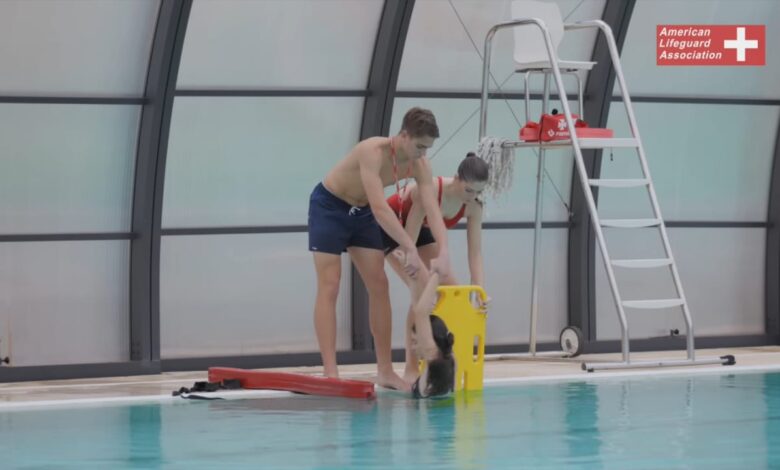Building Discipline Through the Life-Saving Journey of Professional Lifeguarding

Lifeguarding is definitely more than simply sitting in a high chair and overseeing swimmers. A profound obligation encourages discipline, sharpens life-saving skills, and builds character. Aspiring lifeguards should undergo rigorous training to master the technical parts of their role.
In any case, what truly sets them apart is the mental and emotional discipline they develop through their work. Lifeguarding is a profession that saves lives as well as transforms the individuals performing it.
The Foundation of Discipline: Training and Preparation
Before wearing the famous red-and-white uniform, lifeguards should complete far reaching training. The journey begins with lifeguard classes that cover fundamental subjects, for example, water rescue techniques, CPR, and first aid. These classes require serious focus and assurance, training aspiring lifeguards to manage stress and act definitively in critical situations.
The tedious practice of life-saving techniques imparts a strong sense of discipline. Trainees learn that their prosperity — and the safety of others — depends on accuracy and adherence to protocols. This foundational training shapes their professional approach, ensuring they are prepared to deal with high-pressure situations with balance and confidence.
Maintaining Vigilance: A Discipline of Awareness
One of the most crucial parts of lifeguarding is maintaining constant vigilance. A professional lifeguard’s job demands a condition of elevated awareness, expecting them to screen a dynamic environment where seconds can mean the difference among life and death. This degree of mindfulness isn’t natural; it is a discipline developed after some time.
Lifeguards should train their minds to remain focused in any event, during dreary or slow periods. This discipline converts into an important life skill: the ability to remain engaged and present in any errand, paying little mind to external distractions. Such ability is priceless, in lifeguarding as well as in personal and professional undertakings.
Physical Fitness and Routine: Building Healthy Propensities
Professional lifeguards should maintain a high degree of physical fitness to successfully perform their obligations. From swimming long distances to pulling a distressed swimmer to safety, the physical demands of the job are significant. Lifeguards frequently integrate rigorous exercise routines into their daily lives, including swimming laps, strength training, and endurance exercises.
This commitment to physical fitness encourages discipline in maintaining predictable propensities. Lifeguards learn the importance of dedication to self-improvement, balancing their schedules to oblige workouts and staying mindful of their physical health. After some time, these routines add to a disciplined lifestyle that focuses on wellness and capability.
Time Management: Mastering the Clock
The role of a lifeguard isn’t bound to scanning the water. Professionals are also responsible for sticking to schedules, managing shifts, and balancing their obligations with other commitments. Time management becomes a fundamental skill, expecting lifeguards to plan their days productively and meet all their obligations.
Learning to focus on undertakings and manage time really empowers lifeguards to excel both on and off the job. This skill extends beyond their professional lives, assisting them with exploring academics, personal relationships, and other pursuits with clarity and control.
Crisis Management: Discipline Under Pressure
Emergencies are an inescapable part of lifeguarding, and they demand a calm, disciplined response. Lifeguards are trained to act methodically during emergencies, ensuring that their decisions are guided by rationale as opposed to panic.
This ability to remain formed under pressure is the aftereffect of broad training and rehashed openness to high-stakes scenarios during recreations. The discipline gained from managing emergencies successfully becomes a cornerstone of their professional character, empowering lifeguards to handle challenges in any everyday issue.
Leadership and Teamwork: The Discipline of Collaboration
Professional lifeguards frequently work in teams, requiring strong communication and collaboration skills. Powerful teamwork includes common respect, trust, and accountability — characteristics that are nurtured through discipline.
Lifeguards are trained to understand their roles within a team and to contribute their strengths while respecting the commitments of others. This accentuation on disciplined collaboration makes a strong unit fit for responding swiftly to emergencies. These lessons in teamwork are important, helping lifeguards to flourish in group settings and lead with confidence when fundamental.
Lessons in Obligation: A Life-Saving Mindset
Lifeguarding ingrains a profound feeling of culpability. Each decision a lifeguard makes conveys potential results, supporting the importance of accountability. This sense of duty extends beyond the pool or beach, shaping lifeguards into principled individuals who treat their commitments in a serious way.
The discipline gained through such obligation encourages a mindset of reliability and uprightness. Lifeguards learn to hold themselves responsible for their actions, a trait that sets them apart in both their personal and professional lives.
Lifeguarding as a Catalyst for Personal Growth
The discipline gained through professional lifeguarding extends a long ways beyond the bounds of the job. Lifeguards frequently wind up applying these skills in other everyday issues, from academics to careers to relationships. The ability to remain focused, manage stress, and lead successfully are all results of the disciplined lifestyle developed through lifeguarding.
The Role of the American Lifeguard Association
Organizations like the American Lifeguard Association play an essential role in shaping the discipline and skills of professional lifeguards. By giving high-quality lifeguard classes, resources, and certifications, they ensure that lifeguards are prepared to satisfy the needs of their profession.
The association emphasizes the importance of discipline, in mastering life-saving techniques as well as in fostering a culture of liability and excellence. Aspiring lifeguards who train through such programs arise as confident, disciplined individuals prepared to have an effect.
Read also: Affordable Tours of Bordeaux for Americans When Traveling on a Budget
Final Word: Lifeguarding as a Path to Discipline
Professional lifeguarding is considerably more than a job — it is a journey of growth, obligation, and discipline. From rigorous training to genuine applications, lifeguards gain skills that shape them into proficient and solid individuals.
For those considering lifeguarding as a career or a stepping stone, the benefits stretch out a long ways beyond the prompt role. The discipline gained through this profession is a lifelong asset, empowering individuals to excel in each feature of their lives. Also, with the backing of organizations like the American Lifeguard Association, the journey becomes significantly more improving.
Set out on the path of professional lifeguarding, and find how the discipline of saving lives can change your own.




